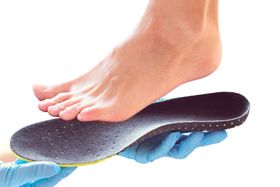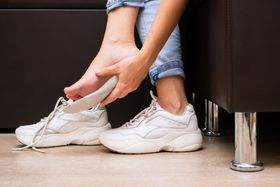Do Epsom Salt Foot Soaks Help Plantar Fasciitis?
Updated December 9, 2024.

Epsom salt, a water-soluble mineral compound consisting of magnesium and sulfate, has been around for years as a home remedy for relieving pain in the feet. Magnesium sulfate is the active ingredient in Epsom salt and is broken down when added to water. The evidence for the benefits of using Epsom salts for pain relief during foot baths is primarily anecdotal, with reports from many people over the years describing the relief from pain and inflammation, alongside other benefits.
Plantar fasciitis is a condition characterized by pain and inflammation originating from the heel and sole of the foot. The plantar fascia is responsible for maintaining the arch of the foot when placed under weight and provides shock absorption when the foot strikes the ground. The causes of plantar fasciitis can be caused by altered foot biomechanics, prolonged periods of standing, and inadequate support from shoes or footwear.
Plantar fasciitis can be treated with a host of home remedies that can manage the pain experienced quite well. By lowering cortisol levels in the bodies of people with high stress, you can reduce inflammation and subsequent pain experienced in the soles of the feet. Epsom salts aid in healing the skin of the foot, eliminating bacteria, and may also provide symptom relief from conditions such as gout.
Do Epsom Salt Foot Baths Actually Help Your Feet?
There are various ways that Epsom salts can help the pain in your feet, including the following:
- Reduces stress and promotes relaxation, which can decrease inflammation in the body
- Reduces pain and inflammation in the feet
- Reduces muscle cramps
- Increases nerve and muscle function
- Increases circulation in the feet, which promotes healing and can assist in preventing blood clots
- Reduces fungal and bacteria growth on the feet and toenails
- Can help ease symptoms of other inflammatory or painful disorders affecting the feet, such as gout or arthritis
» What other treatments can be used with a salt bath? Consider investing in plantar fasciitis custom orthotics as a long-term solution that can easily fit into your lifestyle. Make sure to read product reviews before purchasing orthotics.
Can You Put Essential Oils Into Your Epsom Salt Bath?
The addition of essential oils to your foot bath can further increase your relaxed state and provide some health benefits. Some essential oils have anti-inflammatory benefits that can potentially reduce the pain and inflammation associated with plantar fasciitis.
Two or three drops of peppermint and lavender essential oils can be added to your Epsom salt foot bath to further aid in symptom relief. The aromatic scents from essential oils are relaxing and may help you reduce stress while soaking your feet, essentially clearing your mind while reducing the dryness of your feet.
How You Should Prepare a Foot Bath or Whole Body Soak
Some preparation is needed for this home remedy. Two tablespoons of Epsom salt can be added to one quart of warm water to dissolve it. Ensure that the water is not too hot before submerging your feet in the bath as this may scald them. People with conditions that may cause nerve damage and altered sensation in the feet should be sure to test the water temperature before placing their feet in the bath. Inspecting the foot for blisters should be routinely conducted if you do have altered sensation in your feet and are making use of foot soaking methods.
A larger amount of Epsom salt can be added to a bath of warm water if you are looking to have a full-body soak. The effects of Epsom salt and warm water will aid in reducing pain and inflammation in muscles and joints.
Vinegar can be added to help you treat common bacterial or fungal infections that affect the feet and has been shown to reduce odors as well. One should stop foot soaking with Epsom salts if your skin becomes itchy, a rash develops, or if any kind of adverse symptoms arise.
Why You Should Try an Epsom Salt Bath
The benefits and pleasure derived from a foot soak outweigh any potential risks—which are minimal if even existent at all. However, one should avoid foot soaks if you have open wounds on the feet as this could lead to infections and other complications. Epsom salt can be easily acquired from a health shop or pharmacy at a relatively low cost. Foot soaking is relatively inexpensive and can be enjoyed in the comfort of your own home, about twice a week, to help relax you and improve your mental state, as well as reduce negative symptoms in your feet.








